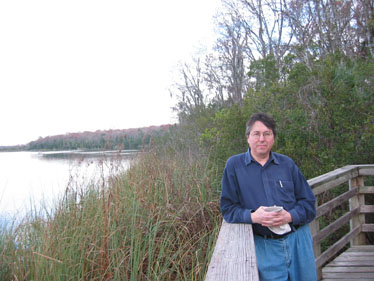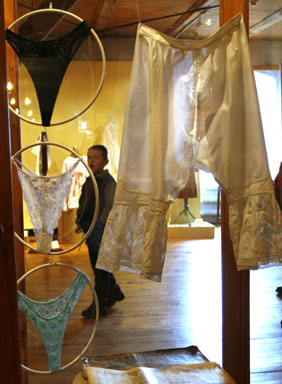Notes Towards Day 24: “Creating Possibility Spaces”
I. Coursekeeping
Multi-media projects
-
resources
-
post your project by 5 p.m on Friday
-
comment on three projects by 5 p.m. on Sunday
-
come to class ready to perform!
Final conferences beginning next week and after;
Portfolios
Wednesday: read Ullman; post questions for guests (thanks, Kalyn!)
Evals?
Laura, Gaming, Education and Possibility Spaces:
advanced games allows each player to create a unique path while seeing, experiencing, and perhaps even feeling the consequence of their decisions….higher ed should create possibility spaces for students and move away from older curriculum, changing with the needs of their students (as gaming companies do). It occurred to me that that’s what we’ve tried to do in this class–the whole class is really envisioned as a possibility space….it’s also up to each student to create possibility spaces for themselves, using the content and discussions from this course and others to open up new ideas and opportunities.
That’s today’s plan (as well as the vision of the whole course):
to create a possibility space for you, both by
sharing what we’ve learned and by
saying what our questions, now, are…
When “Geeky Mom” Met a “Grok, Pure and Simple:”
Strangers in a Strange Land…..
Getting Inside Our Brains…
Big Lesson was a different kind of teaching/”steering”
aaclh: “However – I was talking to my mother about the way this class is run and she thinks that teachers are simply shirking work when they make students pick things. I’m not saying she’s right – but it did make me wonder whether it might be more interesting if the professors picked who presented. I’m also thinking about watchmen – which I didn’t like and the fact that it was picked by majority vote and handmaid’s tale- picked (I think) by the professors that I loved. Why is what a majority vote chooses going to be the most interesting? What makes people (me included) think this? Does anyone have any thoughts about this? At this point I’m not in favor of the class voting – but that could change; I would love to hear what people think about majority voting.”
a different kind of “steering” needed for a course like this
(not “shirking,” but “risky”….)
“cybernetics” [f. Gr.









 steersman, f.
steersman, f. 






 to steer (see GOVERN v.) + -ICS.]
to steer (see GOVERN v.) + -ICS.]
The theory or study of communication and control in living organisms or machines.
1948 N. WIENER Cybernetics 19 We have decided to call the entire field of control and communication theory, whether in the machine or in the animal, by the name Cybernetics.
different kind of “cybercourse…” you can’t control outcomes
Small Lesson #1:
Technology doesn’t always (usually?) work:
but in time, it will!
replaying our “theme song” w/ SOUND this time–>
Paul Simon, “The Boy in the Bubble”:
“These are the days of miracle and wonder
This is the long distance call….”
Lesson #2:
Theory doesn’t always “work” either
Laura: Although I still can’t always figure out how to make theory work in the real world, I do like that it makes me (us) think about the ways we view that real world, to recognize that it is me (us) that makes that world and so, offers us the opportunity to change it.
Lesson #3: Effects of Using Technology
so much to extend classwork
our course webpages have become a new art form
(much gratitude to Laura for teaching me all sorts of new
techno-tricks–gravatars, inserting videos,
live-blogging, etc.–to expand my “artistry”)
Laura: I have a completely new appreciation of the complexities of putting together a good online space for students. The site came really close to being a perfect space, but there were many more things that I wanted it to do, but lack of time and technical expertise kept me from doing them. Anne is an extremely tech-savvy person, but I still forget that not everyone lives in the code the way I do. 🙂
thinking about the ways in which “technology” is NOT quite an art….
Lesson #4: our relationship to on-line worlds
(a topic raised by Alexandra and others…)
clarity that I’m only interested in on-line spaces as
extensions of meat-space, and only interested in
meat-space interactions if they are expansive,
go beyond what we already know we know….
what’s the “ideal” relationship for a class to work well?
Laura: I, on the other hand, am completely okay with having an online only world in some cases. I guess, though, I always hold out hope or the possibility that I might meet some of the people I hang with online. I treat them the same way (usually) as I would if I were with them in person. I do, however, love the back and forth of online and meat-space conversations and appreciate them most, like Anne, when they are expanding on each other.
there can be a problem with the “lack of tangibility”
in the on-line space, as part of a class experience
in the on-line space, as part of a class experience
Further Reflections
“How Can We All Get Along?”: A Conversational Search for Comraderie
“An Effort in Collaboration”: Immediacy and the Slowness of Time
A Serious Playground: The Practical Use-Value
of Serendip’s Web Forums
Lesson #5 from today’s reading
Refusing Wacjman’s critique of Haraway,
for attending to “semiotics over materialism”:
claiming that playing is “a limited form of politics,”
that she is stronger @ “evocative figuration”
than @ providing practical guidelines…
Laura: I’m smiling as I write this because these are my favorite critiques of Haraway. Ever since I first read Haraway, my question has been, “Now what? How does this help me with the sexism I experience every day?” Judith Butler did a lot more for me than Haraway in terms of thinking about gender differently.
by foregrounding the role of metaphor in the production of “facts,”
Haraway “set new terms for the traffic between…nature and culture”
Laura: I agree that Haraway’s critique of the way in which science pretends to be objective when it’s often just another product of social norms is an important one. However, the reality of the structures of the academy don’t allow the “traffic between . . . nature and culture” very often, if at all. I hope that we’ve tried to do some of that in class. Certainly, having read Haraway and others, the social science articles we read look completely different than they would otherwise.
what we were (also trying to) do in this class:
setting new terms for the traffic between popular and academic, between play and work, between students and teachers
searching for the surprises produced by
“lively, unfixed, and unfixing practices”we followed Haraway’s image of “the modest witness,”
morphed into “FemaleMan”:
replacing the ideological fiction/the “god trick” of objective science with contingent, located, multiple (“stronger objectivity”),
more democratic, less “closed,” more self-reflexive,
and so truly modest witnessing of us all
kept up the tension between modernist and postmodernist:
lyrical and obscure, associative and impenetrable
destabilize categories, yet appeal to meta-narratives of justice
acknowledge impossibility of distinguishing
fact/fiction, material/metaphorical–>
yet need the category “woman”
practical (pedestrian) politics:
consensus confuerence model of ordinary citizens debating policy–
that’s us….?
tension between the ideal and the real…
cyborg and oncomouse?
We made this course (with blogs, and the art-space that is our course pages, and….) trying to enact, in both meat and virtual space, our ideals of the relationships between gender and technology.
What will you do?
Pair up now with someone you do not know (who does not already know how you think/what you are thinking about) and tell ’em what you might do w/ an insight you’ve gotten from this course….
How you are going to take (not just Wacjman and Haraway, but) any one of the lessons you’ve learned from this course back into your disciplines, lives, relationships…
how to really (Guenviere!) apply what we have learned?
Write your partner’s “plan” on the board…
and we’ll look together for patterns…
“the crack in the ice where the otters breathe….
The teacher’s failings in which the students ripen….”
(Lewis Hyde, “This Error is the Sign of Love”)







